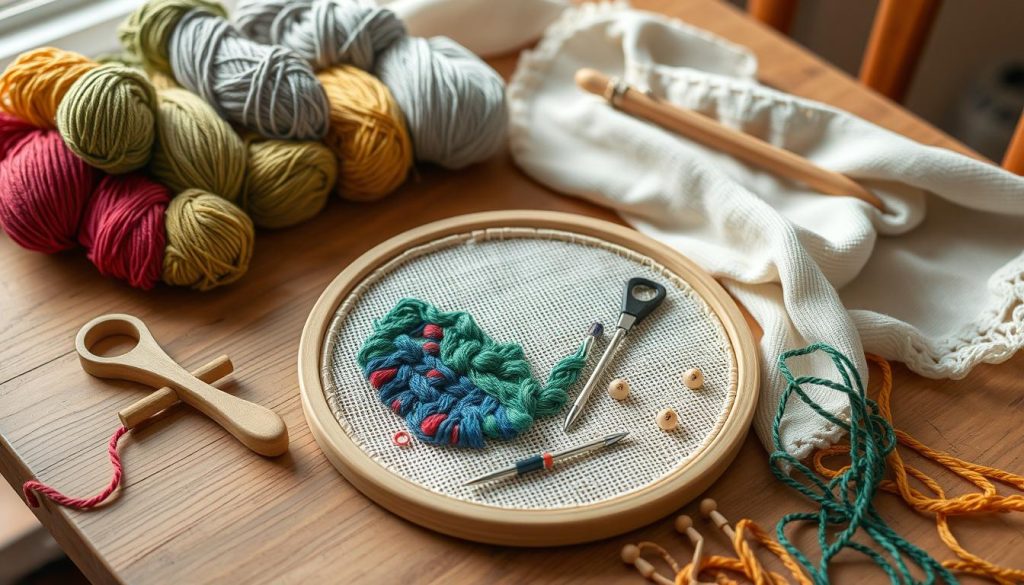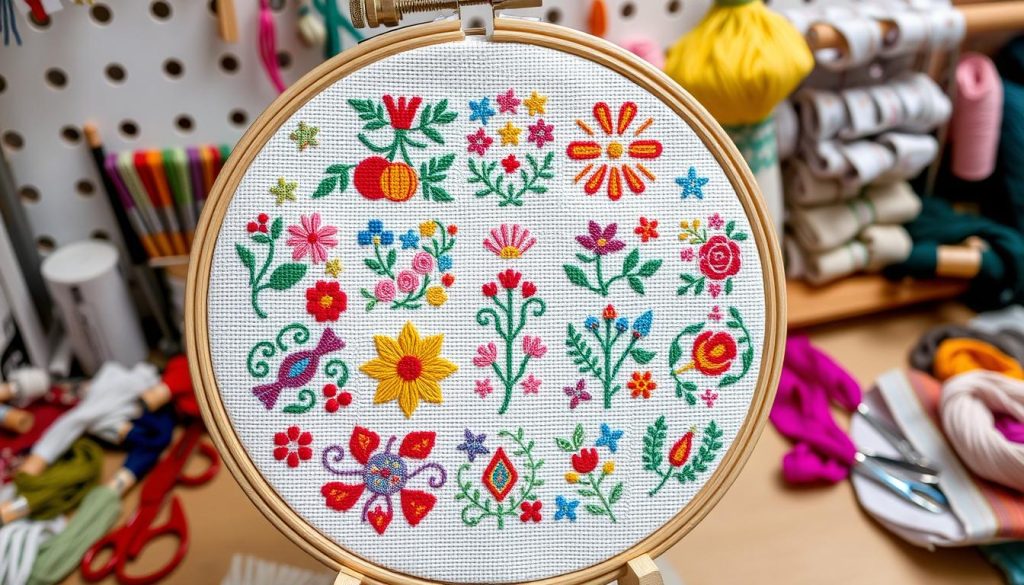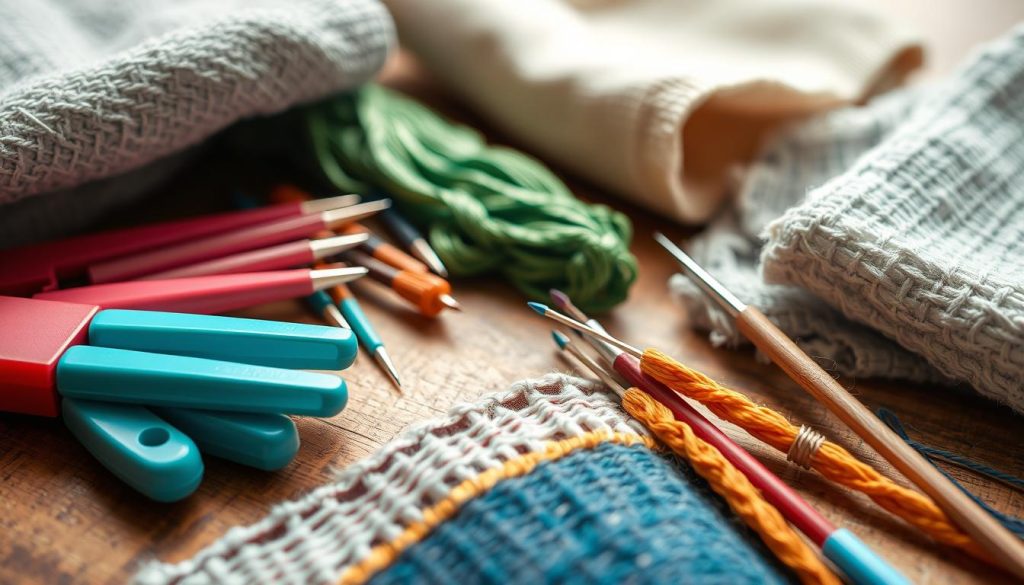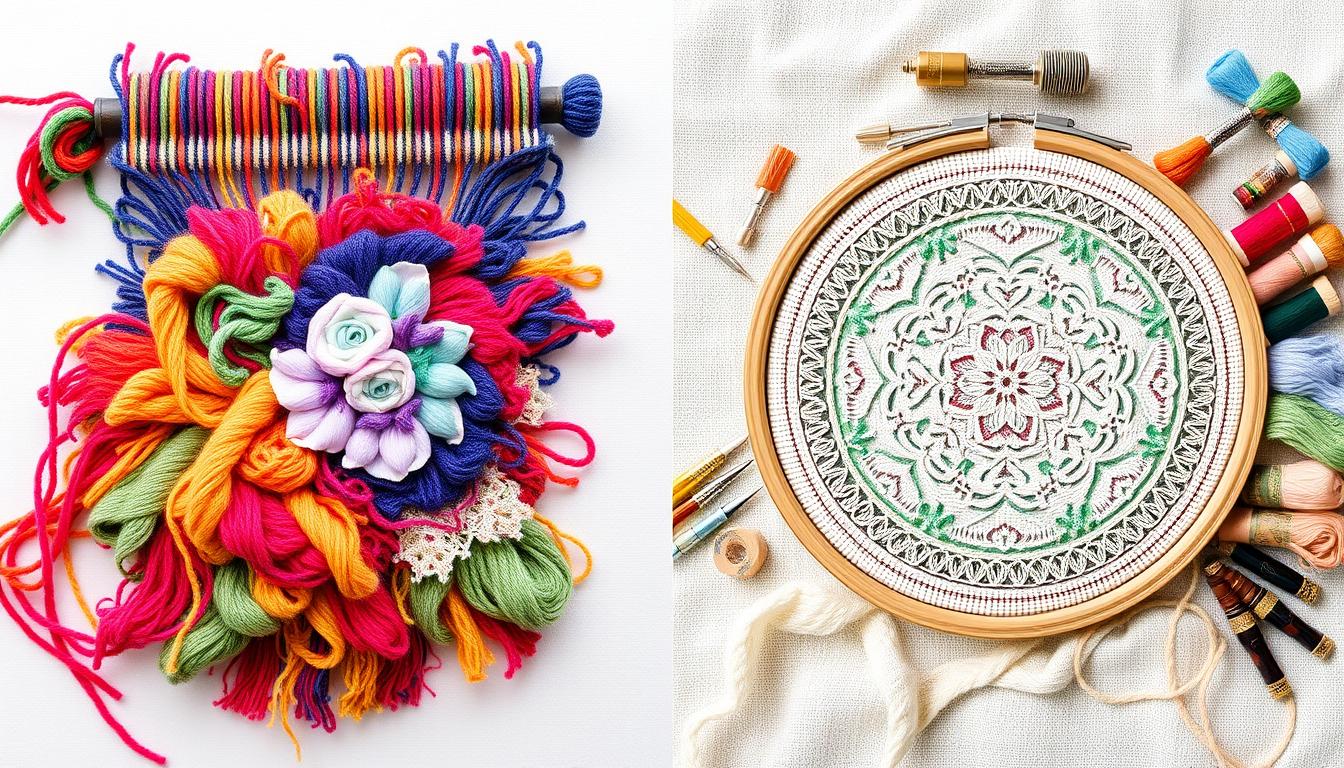When you look into embroidery techniques, you might ask if punch needle is simpler than cross stitch. Both are popular in the crafting world for their special qualities and creative possibilities. This comparison looks at how easy they are to learn, how simple the techniques are, and how fast you can finish a project. It’s to help beginner embroidery fans choose the right one.
Key Takeaways
- 70% of participants found punch needle easier compared to crossstitching.
- Punch needle requires the right choice of material for success, emphasized by 50% of individuals.
- 40% used affordable punch needle kits to begin their projects.
- 60% of crafters emphasize practice as key to success in punch needle embroidery.
- Punch needle projects offer faster execution time than traditional crossstitching.
Understanding Cross Stitch
Cross stitch is a traditional embroidery that uses X-shaped stitches to make designs. It has been loved by people all over the world for centuries.
What is Cross Stitch?
Cross stitch is about making patterns with X-shaped stitches on fabric. It’s easy to learn and fun to do. This makes it great for people of all skill levels.
History of Cross Stitch
The history of crossstitching is long and interesting. It started in ancient times and has changed a lot over the years. Today, it’s a global craft with designs from many cultures.
Basic Techniques and Materials
To start with crossstitching, you need to know the basics:
- Aida Cloth: 14 count Aida fabric is the most popular. It has evenly spaced holes, making it perfect for beginners.
- Embroidery Floss: DMC Stranded Cotton is the best choice. It comes in bright colors and is of high quality. Two strands are usually used.
- Needles: You’ll need sizes 24 and 28 for different fabrics. Sharp-pointed needles are best for precise stitching.
- Hoops: Elbesee hoops, especially 6″ and 7″, keep the fabric tight and make stitching easier.
Learning basic techniques is key. For example, securing the thread by running the needle under three stitches at the back is important. Start from the center of your fabric, moving row by row. Focus on one color at a time.
| Material | Description |
|---|---|
| Aida Cloth | 14 count is most commonly used; facilitates stitch counting. |
| Embroidery Floss | DMC Stranded Cotton is the highly recommended choice. |
| Needles | Sizes 24 and 28 for different fabric types. |
| Hoops | Popular sizes include 6″ and 7″, such as Elbesee hoops. |
Learning about cross stitch materials and techniques will make your journey fun and rewarding. It’s a mix of creativity and tradition.
Introduction to Punch Needle
Punch needle embroidery is a fascinating technique that has been gaining popularity. It offers a textured and plush finish, unlike other needlework.

What is Punch Needle?
Punch needle embroidery uses a hollow needle to create loops on fabric. This makes the fabric feel deep and plush. You’ll need different needle sizes and fabrics like linen and burlap.
Unlike crossstitching, punch needle doesn’t need knots. The fabric’s tight weave keeps the loops in place.
History of Punch Needle
The history of punch needle goes back to ancient Asian textiles. It evolved in the 19th century with new tools. The Oxford Punch Needle is a favorite for its quality and ease.
Today, punch needle is more popular than ever. This has led to more kits, patterns, and tools for crafters.
Differences from Cross Stitch
Punch needle and crossstitching are different. Punch needle is done from the back, while cross stitch is from the front. Punch needle is faster and creates a three-dimensional effect.
Fixing mistakes in punch needle is key. Stitches must be unraveled and fixed quickly. Knowing these differences helps you learn punch needle basics.
Comparing Difficulty Levels
When looking at crossstitching and punch needle, it’s key to think about skill levels, time needed, and common problems. Knowing these can help you choose which craft to try, especially if you’re new to both.
Skill Levels Required for Each
Cross stitch needs a lot of precision and patience. It’s done on 14-count Aida fabric, which means 14 stitches per inch. It’s easier for beginners than some embroidery, but still requires good hand-eye coordination and fine motor skills.
Punch needle is seen as easier and quicker to learn. The main challenge is getting your loops consistent, which is easier for beginners than crossstitching.
Time Commitment for Completion
Time is a big difference. Cross stitch takes a lot of time because each stitch must be placed accurately. Small projects might take hours, but big ones can take weeks or months.
Punch needle, however, is faster. Because it covers more area quickly, you can finish big pieces faster than with crossstitching.
Common Challenges Faced
Both crafts have their own challenges. Cross stitch can be hard because of complex designs and choosing the right materials. The right fabric and threads are key to a beautiful project.
Punch needle’s main challenge is keeping the tension even. This ensures your loops are the right size. It’s tricky at first but gets easier with practice.
Both crossstitching and punch needle are for different skill levels, with kits for beginners to advanced. Cross stitch needs more precision and takes longer, but punch needle is quicker to learn. This lets you start creating art sooner.
Advantages of Cross Stitch
Cross stitch is a rewarding craft for all skill levels. It offers a wide range of patterns and a strong global support network. This makes it a versatile and engaging hobby.

Variety of Patterns Available
There are countless crossstitching designs out there. Whether you’re new or experienced, you’ll find something that fits your skill and interests. This variety lets you create unique pieces for your home or as gifts.
Community and Support
Being part of the cross stitch community is enriching. With thousands of fans worldwide, there are many online forums and local clubs. Here, you can share your work, get advice, and find inspiration.
This community helps you feel connected and reduces loneliness. Research shows that being part of such groups can improve your mental health and overall happiness.
Flexibility in Design Choices
One of the best things about crossstitching is how flexible it is. You can make designs your own, making it perfect for personal expression. It’s also easy to start, needing only basic skills like counting and threading a needle.
- Cognitive and Emotional Benefits of Cross Stitching
- Studies show that cross stitching can lower cortisol levels, helping to reduce stress and promote relaxation.
- It improves concentration and patience because of its repetitive nature.
- Cross stitching releases serotonin and dopamine, making you happier and more well.
- Being in a cross stitching community can help you feel less alone.
- It can also improve your fine motor skills and keep your brain active, which is good for your brain health.
- It can distract you from cravings, helping if you’re trying to diet or quit smoking.
- Completing a project can make you feel proud and boost your mood.
| Aspect | Details |
|---|---|
| Stress Reduction | Helps reduce cortisol levels, promoting relaxation. |
| Mental Health | Improves mood by releasing serotonin and dopamine. |
| Social Connections | Fosters a sense of belonging within the cross stitch community. |
| Skill Development | Enhances fine motor skills and hand-eye coordination. |
| Customization | Allows for unique, personalized designs. |
| Cognitive Benefits | Aids in cognitive rehabilitation and maintains brain plasticity. |
Doing cross stitch is not just fun but also good for your mind, emotions, and social life. It offers a wide range of designs, a supportive community, and endless creativity. This craft is loved by many around the world.
Advantages of Punch Needle
Choosing between embroidery techniques can be tough. Punch needle offers unique benefits that make it stand out. It has become very popular, with over 16 million views on TikTok for Tufting content. Here are some reasons why punch needle might be perfect for your next project.
Faster Execution Time
Punch needle is known for its quick execution. It’s great for those who want quick embroidery projects. Unlike cross-stitch, punch needle uses a simple punching action to create loops.
This action allows for covering large areas fast. It’s perfect for beginners and those who want quick results.
Unique Textural Effects
The loops created by punching yarn give punch needle its unique texture. It’s similar to rug hooking but has cleaner lines. The technique can create intricate patterns and textures.
This adds a unique artistic flare not found in other embroidery methods. Modern artists often show the stitch side of their work, highlighting the striking punch needle textures.
Accessibility for Beginners
Punch needle is easy for beginners to start with. It’s simple to set up and forgiving, making it great for newbies. There are many kits available, from £10 to £70, with discounts like the Beginner Punch Needle Kit at 20% off.
You’ll need adjustable punch needles, durable cloth, and yarn. There are also books and customer support to help. This makes it easy for anyone to start enjoying beginner punch needle.
Tools and Materials: A Comparison
Choosing between cross stitch and punch needle means knowing the tools and materials you need. Let’s look at what you’ll need for each craft and the costs.
Essential Tools for Cross Stitch
Cross stitch starts with a few key tools. Aida cloth is a must, with its holes making it easy for beginners. It comes in counts from 14 to 18, with DMC and Zweigart being top brands.
You’ll also need stranded cotton threads, like those from DMC, which has over 500 colors. Other important tools include:
- Embroidery hoops, from 2 to 12 inches, with Elbesee being a favorite.
- Needles, often from Milward, for cross stitch.
Cross stitch patterns are like painting by numbers, found on Etsy. They help beginners tackle complex designs.
Essential Tools for Punch Needle
Punch needle work needs different tools. The main tool is a punch needle, thicker for this craft. You’ll also need a strong fabric frame. Punch needle has fewer supplies, including:
- A punch needle tool.
- A sturdy frame or hoop for tight fabric.
- Loose-weave fabrics like monk’s cloth or linen.
Punch needle is great for beginners because it’s simple and has fewer tools at first.
Cost Considerations
Looking at costs, punch needle might seem cheaper at first because of fewer tools. But, bigger projects can get expensive with special materials.
Cross stitch can be cheap for simple projects but more expensive for complex ones. Here’s a cost comparison:
| Aspect | Cross Stitch | Punch Needle |
|---|---|---|
| Initial Tools | $20-$50 | $15-$40 |
| Fabric Costs | $5-$25 per yard | $10-$30 per yard |
| Thread/Yarn | $0.50-$1 per skein | $2-$10 per skein |
| Pattern Costs | $5-$20 | $7-$25 |
| Average Project Cost | $30-$100 | $25-$90 |
The cost of both crafts varies with project size and material quality. Cross stitch might be cheaper for small projects, but punch needle can save money over time.

Tips for Beginners in Both Techniques
Starting your journey in cross stitch or punch needle can be very rewarding. With the right help and resources, beginners can quickly learn these crafts. They can then create beautiful projects.
Learning Cross Stitch Basics
If you want to learn cross stitch, start with a lower Aida count like 8 or 10. This makes it easier. Moving to higher counts like 12, 14, or 16 needs good eyesight, especially for counts in the 20s.
Begin with kits that have Aida fabric, skeins, a needle, and a pattern. This helps you learn the basics before trying your own designs.
- Use your knees to separate skein threads to prevent knotting.
- Choose quality skeins to allow the thread to glide smoothly through the fabric.
- Complete vertical stitches all at once, then proceed with the downward stitches.
- Start stitching in the middle of the design for proper alignment.
- Bind fabric edges to prevent fraying using zig-zag stitches, a serger, or masking tape.
- Use an embroidery hoop to stretch the fabric taut for ease of stitching.
- Allow the thread to unwind occasionally to avoid twisting.
Starting with Punch Needle
For those new to punch needle for beginners, it’s quite simple. Punch needle is known for its quick work and unique textures. Start with a simple pattern and get used to punching the needle through the fabric to make loops.
Keeping the tension even is key for even loops and a nice finish.
Online Resources and Communities
There are many embroidery online resources to help you craft. Websites like DMC, LoveCrafts, Country Living, and The Spruce Crafts have free patterns and tutorials. YouTube tutorials, online courses, and forums are also great for learning more and connecting with others.
Using these tips and online resources will help you succeed in cross stitch and punch needle. It will make your crafting journey fulfilling as you improve your skills.
Conclusion: Which One is Right for You?
Choosing between punch needle and cross stitch depends on your goals and what you enjoy about crafting. If you like quick projects and rich textures, punch needle might be for you. Cross stitch, with its detailed work, could be more appealing if you enjoy precision.
Personal Preferences and Goals
Your embroidery style should match your goals. Punch needle is great for fast projects and textured results. Cross stitch, on the other hand, is perfect for those who love detailed work. Think about the cost of materials and tools, like DMC floss for cross stitch, to help decide.
Enjoyment and Creativity Factors
Both methods offer unique creative experiences. Cross stitch is calming and detailed, making it meditative. Punch needle is quicker and creates unique textures, offering fast visual results.
Making the Right Choice for Your Crafting Journey
Choosing the right embroidery method depends on your preferences and lifestyle. Cross stitch is great for those who value organization, with supplies like Mindful Crafts’ Celestial Kit. Punch needle is ideal for those who love textures and variety. Consider your interests and goals to pick the best method for you.
